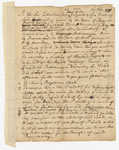Keywords: ownership
Item 102285
Falmouth Neck deed of ownership, Portland, 1764
Contributed by: Maine Historical Society Date: 1764-10-01 Location: Portland Media: Ink on paper
Item 28456
Deed: William King to Ledyard and Palmer, Bath, 1806
Contributed by: Patten Free Library Date: 1806-11-25 Location: Bath Media: Ink on paper
Item 32438
34-36 Atlantic Street, Portland, 1924
Owner in 1924: Josephine W Cummings Style: Greek Revival Use: Dwelling - Single family
Item 48969
39-41 Deering Street, Portland, 1924
Owner in 1924: Mary L F Earnshaur Use: Dwelling - Four Family
Item 151749
W.W. Thomas House, Portland, 1915-1927
Contributed by: Maine Historical Society Date: 1915–1927 Location: Portland Clients: W. W. Thomas; Mary Cate Thomas Architect: Frederick A. Tompson; Frederick A. Tompson, Architect
Exhibit
The history of the region now known as Maine did not begin at statehood in 1820. What was Maine before it was a state? How did Maine separate from Massachusetts? How has the Maine we experience today been shaped by thousands of years of history?
Exhibit
Settling along the Androscoggin and Kennebec
The Proprietors of the Township of Brunswick was a land company formed in 1714 and it set out to settle lands along the Androscoggin and Kennebec Rivers in Maine.
Site Page
Beyond Borders - Mapping Maine and the Northeast Boundary - Further Reading
"… A Study of Eighteenth-Century Absentee Land Ownership on the Maine Frontier, 1714-1768, 1973. Greer, Allan."
Site Page
"… in an area meant an absence of any legal ownership. Seventeenth-century English, confronted by the reality of powerful Indigenous Nations on this…"
Story
Ann Luginbuhl - One-to-one in a small rural school
by MLTI Stories of Impact Project
Ann Luginbuhl describes the arrival of one-to-one in a K-8 school of 30 students.
Story
Dan Gagne: The story behind Biddeford’s legendary speed skater
by Biddeford Cultural & Heritage Center
Stories from a competitive athlete with countless awards and contributions to his community
Lesson Plan
Nation to Nation: Treaties and Legislation between the Wabanaki Nations and the State of Maine
Grade Level: 9-12
Content Area: Social Studies
This lesson plan asks high school students to think critically about and look closely at documentation regarding the Nation-to-Nation relationship between the Wabanaki Tribes/Nations and the State of Maine. This lesson asks students to participate in discussions about morality and legislative actions over time. Students will gain experience examining and responding to primary and secondary sources by taking a close look at documents relating to the Maine Indian Claims Settlement Act of 1980 (MICSA) and the issues that preceded and have followed the Act.

















